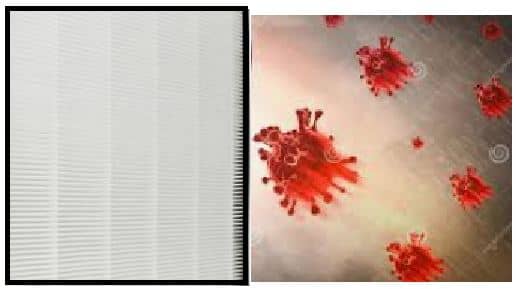An air purifier is made to clear the air of particles as small as 0.3 microns. Now an air filter cannot differentiate between viruses, bacteria or dust. Most viruses have sizes falling in the 5 nanometer to 400 nanometer ranges. Viruses are generally smaller than bacteria. So, do air purifiers kill viruses? The answer to question is explored in this post. Firstly, I’d like to mention that viruses are different than bacteria and other microbes in many ways. You can explore more on Virus masks which can secure our nasal passages from becoming a host to viruses.
Air purifiers remove viruses and bacteria by trapping them on their filters or even destroying them. Ultraviolet bulbs, ionizers or special coatings on the filters ensure complete decimation of pathogens. If these features are not present in your air purifier then the filter surface can itself become a source of secondary pollution. The fan can start throwing the trapped viruses and bacteria back into the room’s air along with dust. With this we have answered to the original question of “Do Air purifiers kill viruses”. Air purifiers cannot be considered devices to remove all bacteria or virus from the air. Infact, nothing in the World can remove them completely from the room. Humans have been living with them and only some rogue strains of these cause diseases like the Coronavirus.
DO AIR PURIFIERS KILL VIRUSES
To fully understand our answer above, you need to understand that an air purifier is not a disinfectant. Yes, it just serves to capture the airborne particles from the air inside its filter layers. So, basically its just the filtration stages which allow it to the needful on viruses and bacteria.
1. HEPA Filter
HEPA filters are our best bet and every other air purifier uses them if not their own versions of filters. The HEPA filters are not designed to disinfect the air passing them. The trapped bacteria or viruses can continue to remain active on the filter surface till quite sometime. In general, HEPA filters can trap particles up to 300 nanometres or 0.3 microns. The Chinese Coronavirus is also around 60 – 140 nm. So, it should be impossible for the HEPA filter to trap a COVID-19, right? Does a HEPA filter kills viruses or not?
Wrong! It seems theoretically impossible, but in reality HEPA filters trap a large number of viruses. The convulated surface of the filter traps particles without any selectivity or partiality. Particles inside the filter move in random directions as they pass through. Particles like dust or germs, so small in size do not move in a linear way. Their randomized motion in which they change directions in a haphazard way is called Brownian movements. This causes dust and particles to stick to the surfaces of filters. There is an inherent electrostatic charge present in the filter media. This is the reason why it succeeds in holding the particles and prevents their escape.
DOES HEPA FILTER KILL VIRUS?
As mentioned multiple times above, HEPA filters just trap the particles including viruses. However, some air purifiers like the Coway Sleek Pro Air Purifier have special coatings of anti-viral substances which destroy viruses and bacteria. The coatings are derived from specific plants or trees like Gingko or Sumac. Similarly, some air purifiers have a UV bulb contained inside the HEPA filter to disinfect it.
2. PECO Filter
A new type of filter developed is the PECO filter found exclusively in Molekule air purifiers. PECO or Photo Electrochemical Oxidation is the dual use of conventional electrostatic and mechanical mechanism with which HEPA filters work. In addition to it PECO filters use a layer of nanocatalysts over the filter surface. When light from LEDs falls on the PECO filter’s nanocatalyst, a chemical reaction occurs which releases OH- ions into the air. OH- or hydroxl ions are strong oxidizers. The hydroxl ions attack pollutants including VOCs, pathogens and converts them into harmless byproducts.
PECO vs HEPA Filter
There is a big difference between PECO and HEPA filters. A PECO filter destroys pollutants at a microscopic scale, including VOCs and micro-organisms. A HEPA filter on the other hand just arrests the particles. A PECO filter is much more efficient than a HEPA filter but also costs more. It removes particles as small as 0.1 nm. In other words a PECO filter can remove particles a 1000 times smaller than what a HEPA filter is capable of filtering. So, a PECO vs HEPA filter showdown is heavily tilted towards the former.
PECO filter not only kills the micro-organisms but also renders their toxins harmless. These filters. This filter size here is definitely smaller than the size of a virus, so it can easily trap it. But as said, if your doors and windows are open, you need to keep the purifier running at all times.
DOES A PECO FILTER KILLS VIRUSES AND BACTERIA?
PECO filter by means of their powerful oxidizing properties eliminate bacteria and viruses. Every micro-organism is made of some proteins or lipids. The nanocatalyst on PECO filters disintegrates the building blocks of these pathogens. Hence, the answer is Yes! A PECO filter not just traps but also neutralizes virus and bacteria. Whatever remains of their ‘dead bodies’ is not of any harm to us.
3. ULTRAVIOLET LIGHT (UV-C STERILIZING)
UV light acts as a sterilizer and this is widely being used in Ultraviolet wands. These UV sterilizer wands are a convenient and no-fuss way of sanitizing surfaces. However, for UV light to be able to kill bacteria and viruses, they must be exposed to it for at least a few minutes.
There are no filters which only use the UV light as light is incapable of acting on dust particles or odors. UV-C bulbs are generally placed inside the filters to disinfect them. There are many air purifiers which employ ultraviolet light. Apart from the usual filtration stages involving HEPA, carbon filters or similar, A UV bulb is also found in some air purifiers.
